Cover
Story
By Jessica Jacobsen
Beverage-makers share expertise to develop new products with familiar brands
The sweet notes of beverage

In the music industry, collaborations with other musical groups is a celebrated pastime. Whether its Aerosmith and Run-D.M.C.’s “Walk This Way,” Queen and David Bowie’s “Under Pressure,” or Boyz II Men and Mariah Carey’s “One Sweet Day,” musical projects have crossed genres in an effort to unite fans. Now in the U.S. beverage market, consumers are seeing more of their favorite brands and companies partner to cross figurative lines by entering new categories and offer more celebrated choices to consumers.
And it seems as though consumers are on board for these out-of-the-box collaborations. Citing a Visual Objects 2021 survey, Erin Costello, communications and events associate at Niles, Ill.-based Imbibe, notes that 71% of consumers are in favor of brands collaborating to develop a unique product.
“Leveraging another company’s networks, technical knowledge and bandwidth, and reputation gives brands the ability to extend their portfolio,” she says. “Coca-Cola expanded its assortment of soft drinks by partnering with Constellation Brands to produce and distribute Fresca Mixed, an alcoholic version of their citrus-flavored soft drink. Since Coca-Cola doesn’t currently manufacture alcohol, the beverage giants have utilized their relationship with Molson Coors as well, to create a Topo Chico Hard Seltzer and Simply Spiked Lemonade.”
Costello adds that collaboration among big brands allows partners to access established consumers, thereby presenting opportunities to create products through licensing deals. For example, Danone SA and Hershey Co. collaborated on International Delight Reese’s Iced Coffee.
Molson Coors Beverage Co. and The Coca-Cola Co. expanded their partnership this year with the release of Topo Chico Ranch Water Hard Seltzer. (Image courtesy of Molson Coors Beverage Co.)
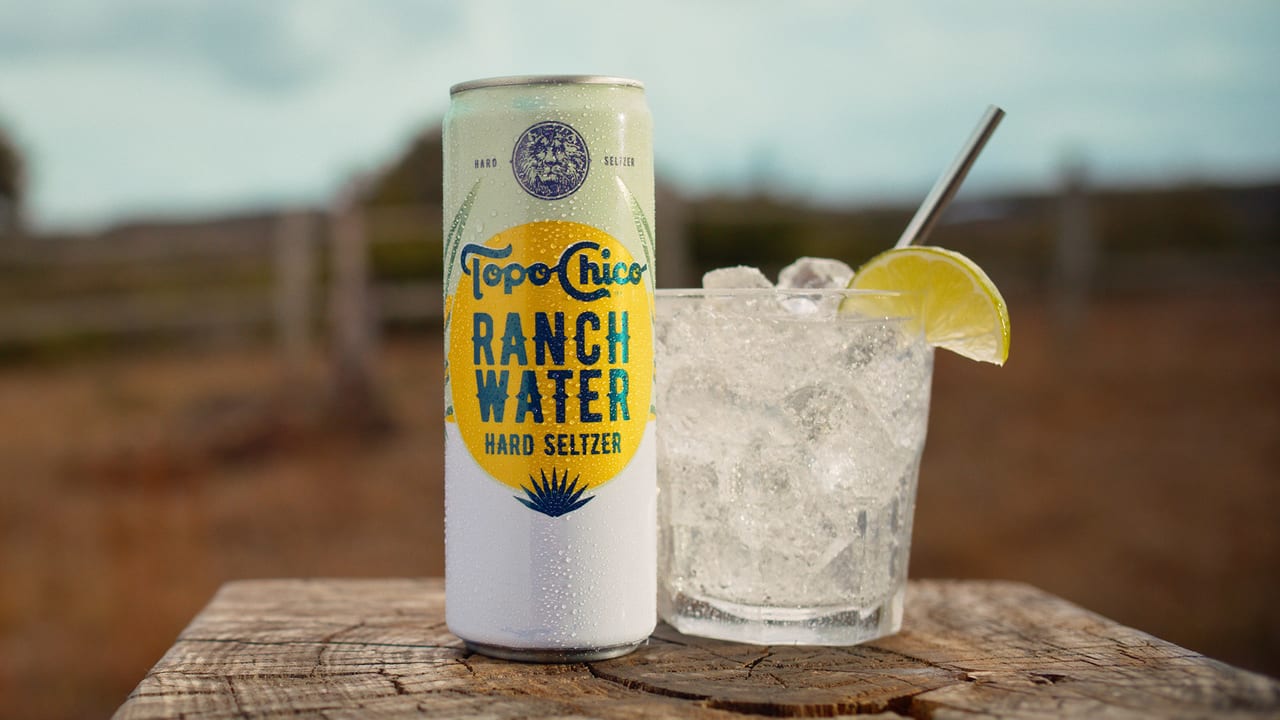
“The power of association doesn’t stop at conventional brands, as celebrities (traditional and Instagram) have been able to use their star power to influence new product development and push products they believe in ― or get paid to believe in,” Costello explains.
“When making a purchasing decision, 49% of consumers depend on influencer recommendations,” she adds, citing 2021 data from Digital Marketing Institute.
“The buzz around the late 2021 roll out of Tim Horton’s and Justin Bieber’s line of products boosted the Canadian fast food restaurant’s sales by 10.3% in the fourth quarter,” she continues, citing a recent New York Post article.
Power of brand recognition
As beverage brands look to cross into new territory, two non-alcohol beverage corporations have caught the attention of analysts: Atlanta-based The Coca-Cola Co. and Purchase, N.Y.-based PepsiCo.
In a February blog post titled “Coke and Pepsi go hard with new RTD alcoholic drinks,” Caleb Bryant, associate director of food and drink at Chicago-based Mintel, details that the rivalry between the companies now will extend to the beverage alcohol space thanks to their respective new partnerships.
For instance, The Coca-Cola Co.’s partnership with Chicago-based Molson Coors Beverage Co. began with the 2021 launch of Topo Chico Hard Seltzer, now followed up with Topo Chico Ranch Water Hard Seltzer and Simply Spiked.
Topo Chico Ranch Water Hard Seltzer, featuring a 4.7% ABV, can be found in stores across Alabama, Arizona, California, Colorado, Georgia, New Mexico, Oklahoma, Tennessee and Texas. Meanwhile, the 5% ABV Simply Spiked will launch this summer.
“The Coca-Cola Co. and Molson Coors have a thriving relationship in North America. The proof is in the success of Topo Chico Hard Seltzer’s national expansion and the introduction of Topo Chico Ranch Water Hard Seltzer,” said Dan White, chief of new revenue streams for Coca-Cola North America Operating Unit, in a statement earlier this year. “With this momentum, we are excited to expand our relationship with products inspired by another one of our most valuable brands: Simply. We believe people will be excited to try this delicious beverage when it arrives on shelves later this year.”
As noted earlier in this article, The Coca-Cola Co. also has partnered with Victor, N.Y.-based Constellation Brands for the future launch of FRESCA Mixed, a new line of 5% ABV spirit-based, ready-to-drink (RTD) cocktails that is expected to launch this year in three flavors: Original, Black Cherry and Watermelon.
“Leveraging another company’s networks, technical knowledge and bandwidth, and reputation gives brands the ability to extend their portfolio.”
— Erin Costello, communications and events associate at Imbibe
Leveraging its credentials as a popular mixer, FRESCA Mixed cocktails will balance the FRESCA flavor consumers expect with quality spirit bases rooted in Constellation’s expertise, the companies say.
“The Coca-Cola Co.’s FRESCA brand is not only trusted by consumers, but also directly delivers on consumer preferences for refreshment, flavor, and convenience ― attributes that also play well within beverage alcohol and where we can leverage our expertise,” said Bill Newlands, Constellation’s president and CEO, in a statement earlier this year.
PepsiCo’s entry into the beverage alcohol space stems from its partnership with Boston-based The Boston Beer Co. and the creation of HARD MTN DEW, a new 5% ABV alcohol beverage featuring four flavors: original MTN DEW, Baja Blast, Black Cherry and Watermelon. HARD MTN DEW currently is available across Florida, Tennessee and Iowa ― with expanded availability to be announced throughout 2022.
“The Boston Beer Co. and PepsiCo share a passion for pushing boundaries and delivering innovative new beverages that meet the evolving demands of U.S. drinkers,” said Lesya Lysyj, chief marketing officer of The Boston Beer Co., in a statement. “HARD MTN DEW delivers on the bold, citrus flavors of the soft drink fans know and love, now with an added bite of 5% ABV.”
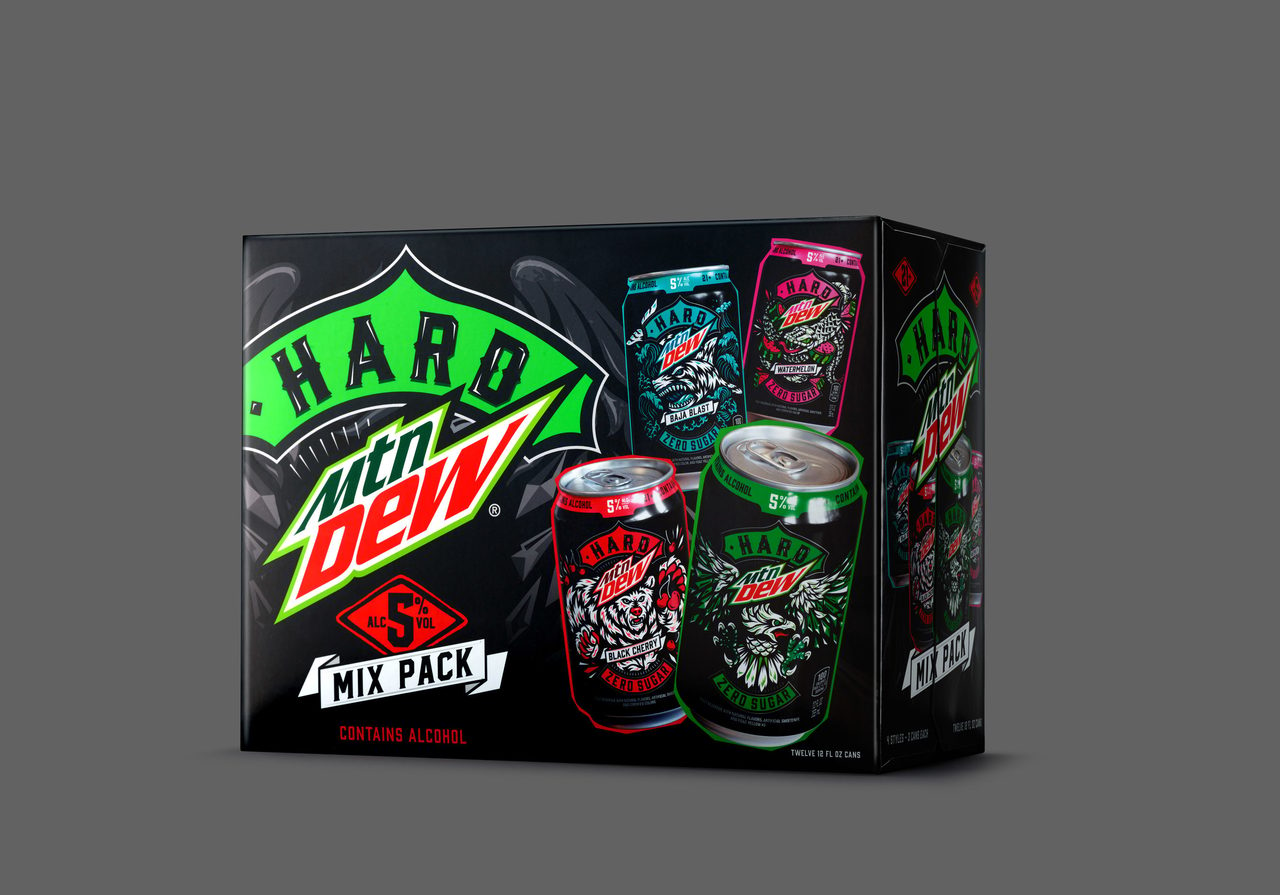
The Boston Beer Co. and PepsiCo collaborated for the release of HARD MTN DEW, a new alcohol beverage featuring four flavors: original MTN DEW, Baja Blast, Black Cherry and Watermelon. (Image courtesy of The Boston Beer Co.)
As part of the business arrangement, Boston Beer will develop and produce HARD MTN DEW, while Blue Cloud Distribution Inc., a new entity, wholly owned by PepsiCo, is responsible for the wholesale operations of HARD MTN DEW, including sales, distribution and merchandising.
In his blog post, Mintel’s Bryant noted that PepsiCo has filed a trademark application that indicates it also plans to produce beverage alcohol products under the Rockstar brand.
“Coke and Pepsi are hoping to strike gold within the rapidly expanding RTD alcoholic beverage market,” Bryant stated. “Total volume sales of FMBs (flavored malt beverages) increased an estimated 364% from 2016 to 2021, while volume sales of RTD spirit-based cocktails increased 226% making each respective beverage type some of the fastest growing segments of the entire alcoholic beverage industry.”
Although the proliferation of beverage alcohol RTD and FMB brands could challenge most new entrants, Bryant noted that the brand recognition from The Coca-Cola Co. and PepsiCo portfolio will help them stand out.
“Coke and Pepsi’s new RTD alcoholic brands have an immediate competitive advantage over other RTD products due to an existing consumer base and brand familiarity,” Bryant stated. “Consumers, especially now during this period of high inflation, want to spend money on drinks they know they will enjoy; launching RTD alcoholic beverages under an existing brand name offers consumers a layer of trust and familiarity. Twenty-six percent of consumers cite ‘well-known brand’ as important when purchasing a RTD alcoholic beverage.”
Bryant concludes his post prognosticating that collaborative efforts are in its early stages and the market can expect to see more of these innovations. “Expect more crossover and collaboration between brewers and non-alcoholic beverage companies as more consumers shift away from beer and toward RTDs and spirit-based drinks,” he says.
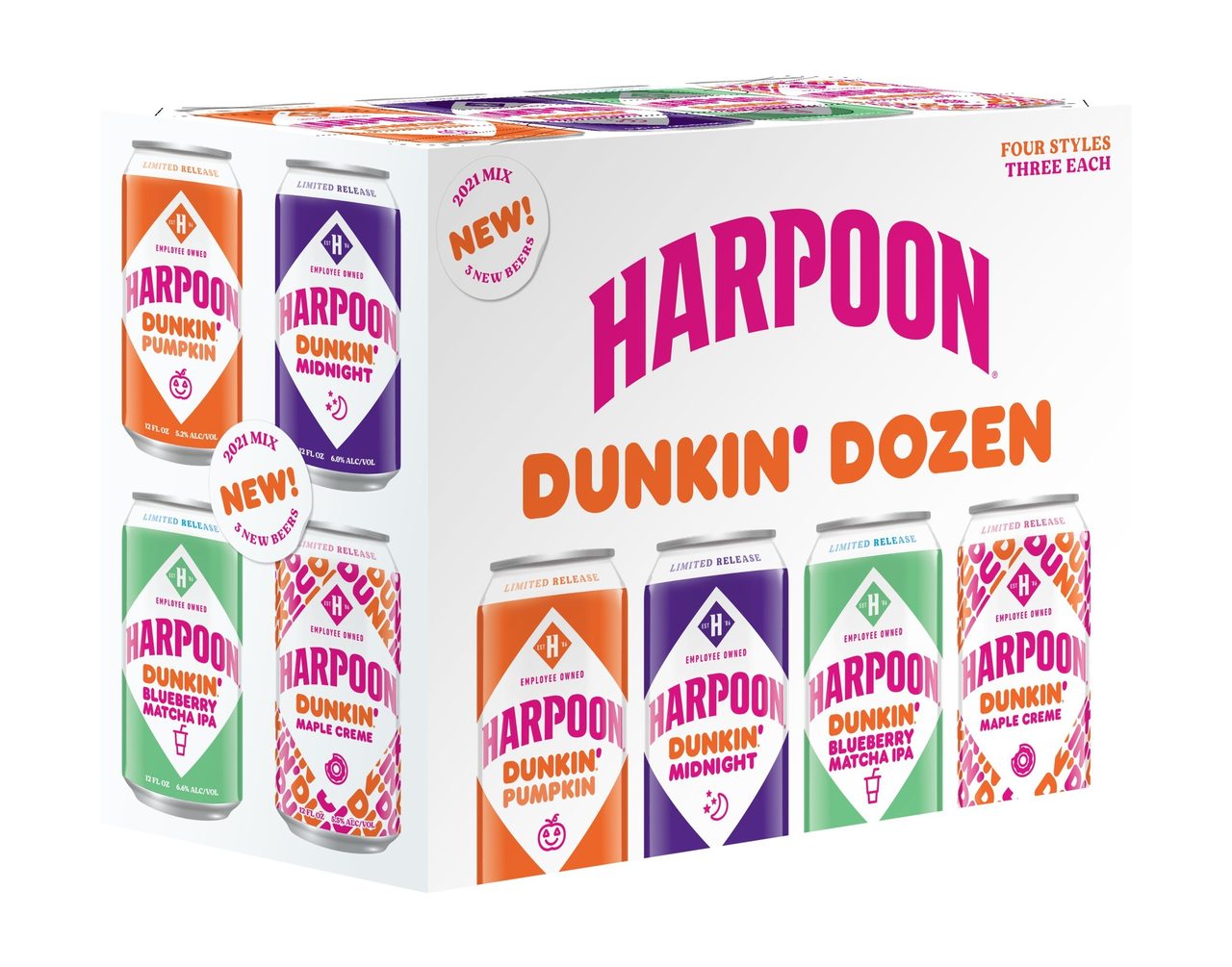
Harpoon Brewery and Dunkin’ continued their collaboration with the Harpoon Dunkin’ Dozen mix-pack this past fall. (Image courtesy of Harpoon Brewery)
Iconic partnerships
Although The Coca-Cola Co. and PepsiCo’s respective entries into the beverage alcohol space might be generating the most buzz as of late, many beverage-makers have recognized the benefits of these symbiotic relationships.
For instance, Boston-based Harpoon Brewery and Dunkin’ have collaborated four consecutive years on craft beers inspired by the coffee brand. As part of the Harpoon Dunkin’ Dozen mix-pack, the brewery offered four beers this past fall that were formulated with coffee, doughnuts or matcha tea from Dunkin’: fan-favorite Harpoon Dunkin’ Pumpkin Spiced Latte Ale, Harpoon Dunkin' Blueberry Matcha IPA, Harpoon Dunkin’ Maple Crème Blonde Ale and Harpoon Dunkin’ Midnight American Porter.
“We have elevated our collaboration with Harpoon this fall with three new beers, all made with Dunkin’s iconic coffee, donuts and matcha tea,” said Brian Gilbert, vice president of retail business development at Dunkin’, in a statement at the time of the release. “Beer, matcha, coffee and doughnuts, we can’t think of a better combination.”
D.G. Yuengling & Son Inc., Pottsville, Pa., also used its fall seasonal release to continue its partnership with Hershey’s for the limited-release of Yuengling Hershey’s Chocolate Porter. The companies even amplified the release with a Scary Delicious Tour, which made stops at some haunted Halloween destinations in Pennsylvania as well as surprising several Yuengling Hershey’s Chocolate Porter “super fans” with a special delivery, directly to their front steps, the companies said.
“Year after year we are blown away by the excitement our fans show for this special collaboration beer,” said Jennifer Yuengling, vice president of operations and sixth generation brewer for D.G. Yuengling & Son Inc., in a statement at the time of the release. “One of our top priorities is, and always has been, staying connected with our fans and listening to our consumers. We’ve heard that our beer is the go-to choice for Halloween fanatics that celebrate all month long. So, in keeping with that tradition, we decided to make this year’s return even more exciting by engaging with our fans around this passion point. We invite consumers of legal drinking age to get in on the fun for their chance to experience this year’s Yuengling Hershey's Chocolate Porter Scary Delicious Tour.”
However, alcohol and non-alcohol brand partnerships are not the only collaborations that the beverage alcohol market can expect to see.
Last summer, The Boston Beer Co. and Chicago-based Beam Suntory formed a long-term strategic partnership. Through this partnership, Beam Suntory, a world leader in premium spirits, and Boston Beer, a pioneer in craft beer, initially plan to launch products that bring the Sauza tequila brand further into RTDs, and Truly Hard Seltzer into bottled spirits. The innovations are expected to launch later this year.
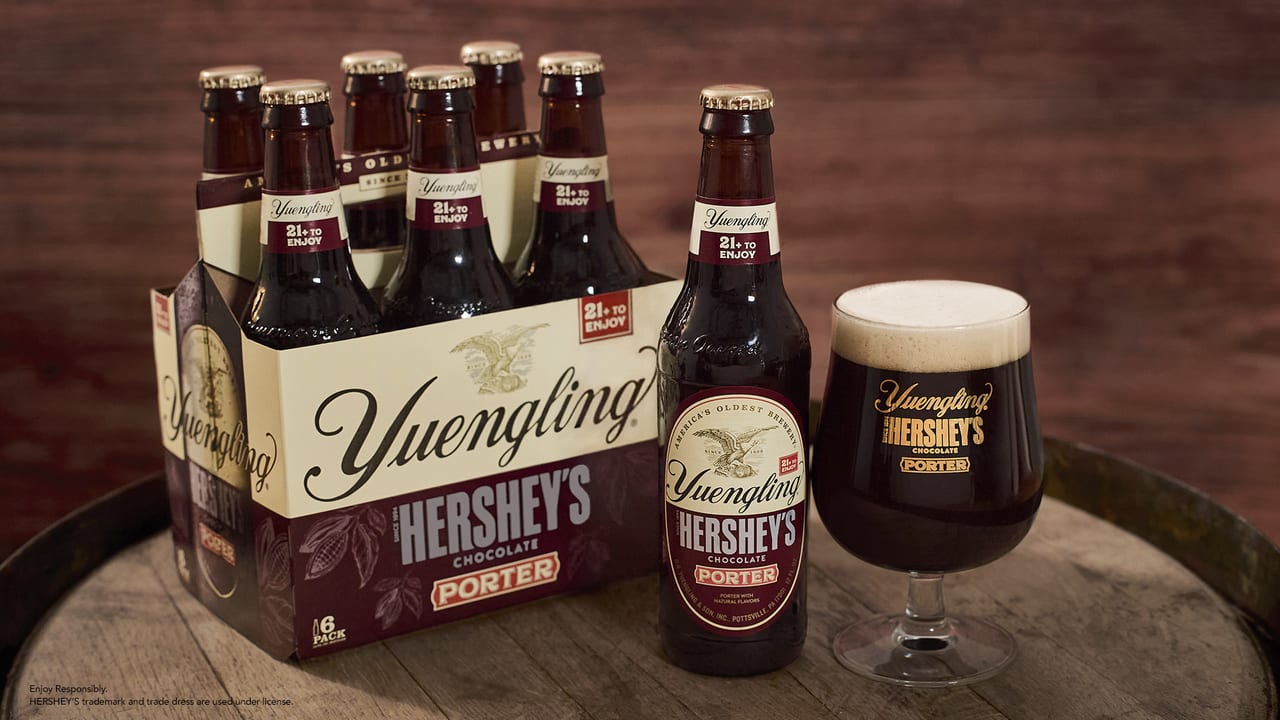
D.G. Yuengling & Son Inc. and Hershey’s continue to partner for the limited-release of Yuengling Hershey’s Chocolate Porter. (Image courtesy of D.G. Yuengling & Son Inc.)
“We are each tapping opportunities in adjacent categories by unleashing our shared creativity and respective distribution strengths in spaces that resonate with consumers,” said Albert Baladi, Beam Suntory president and CEO, in a statement last year. “We’re expanding the reach of loved, iconic brands that have tremendous equity, credibility, and consumer loyalty. Beam Suntory and Boston Beer understand brand building, and as pioneers in premium spirits and craft beer, our combined possibilities are limitless.”
According to initial reports from Food & Wine magazine, Truly Flavored Vodka now is available at select retailers in Strawberry Lemonade, Wild Berry and Pineapple Mango varieties.
Better-for-you approach
As beverage-makers approach new product development through collaborations, experts note that the better-for-you trends will remain an important factor for consideration.
“Collaboration beverages with functional benefits have been popping up more and more as better-for-you options are becoming increasingly enticing to consumers. A recent survey showed that 45% of consumers rated eating less sugar as their number one goal in 2022, ahead of weight loss and improved diet healthfulness,” Imbibe’s Costello says, citing IFIC’s 2022 Food and Health Survey. “While we have experienced notable growth in projects that use our Pre/Sense Stevia to reduce the amount of sugar (without significantly impacting sweetness or mouthfeel) in beverages, brand partnerships have also started utilizing these consumer insights.
“Gwyneth Paltrow’s health-and-wellness brand partnered with Miami Cocktail Co. for the 2021 launch of their organic certified, no sugar added, clean ingredient canned cocktail, Limonata Spritz, which is meant to target consumers looking for healthier alcoholic options,” she continues. “Better-for-you cocktail mixers from Avec, which contain zero to 4 grams of sugar, were repackaged into a more upscale outfit in a recent partnership with Williams Sonoma.”
Brands also are amalgamating “better-for-you” with indulgence. For example, last fall, C4 Energy, a brand of Nutrabolt, Austin, Texas, embarked on a partnership with Mars Wrigley to launch four new STARBURST candy-inspired flavors: Strawberry, Cherry, Orange and Lemon.
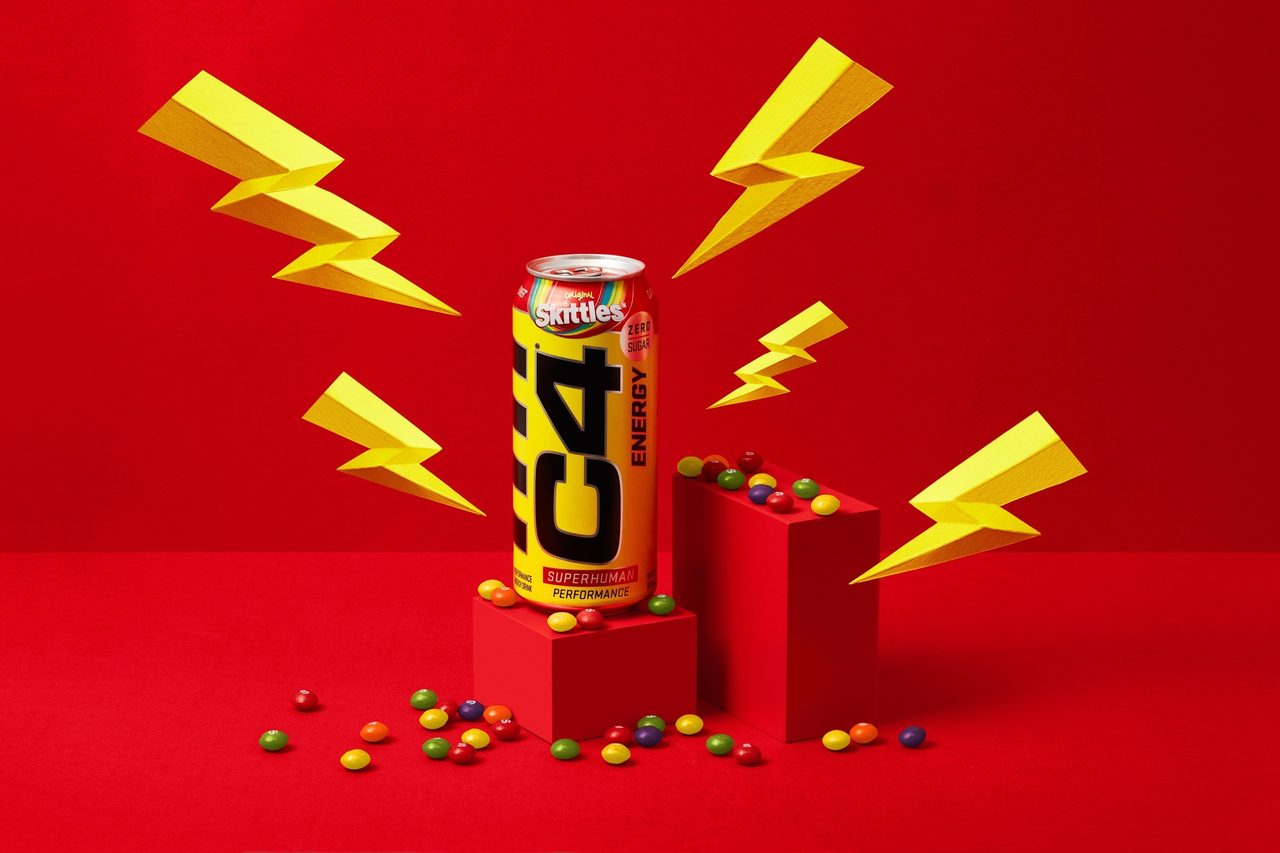
C4 Energy expanded on its partnership with Mars Wrigley with the recent release of C4 Energy x Skittles. (Image courtesy of Nutrabolt)
“We set out to find the perfect partnership that would combine the strengths of two recognizable brands known for incredible flavor and unbelievably devoted customer bases,” said John Herman, chief commercial officer of Nutrabolt, in a statement at the time of the release. “Over two years in the making, both teams worked together to deliver the closest possible candy flavor experience via our zero-sugar performance energy drinks that will ignite one’s taste buds and exceed flavor expectations. The innovative flavor collaboration created with Mars Wrigley was inspired by our unwavering commitment to serve our loyal fans and help them maximize their performance while also having fun in the process.”
Earlier this year, the companies expanded on its collaboration efforts with the release of C4 Energy x Skittles.
“Following the 2021 launch of the C4 Energy x Starburst candy collaboration, Nutrabolt’s ongoing partnership with Mars Wrigley just inspired a new flavored energy drink, this time using the Skittles brand,” Imbibe’s Costello explains. “C4 energy drinks are positioned to increase athletic performance so this type of joint effort gives Mars Wrigley an opportunity to offer a product that mirrors the flavor of their candy, while accommodating consumers that are looking for zero sugar and functional options.”
As consumers embrace more beverage brand collaborations ― or even food and beverage brands ― today’s beverage-makers will have more opportunities to expand their brand equity. BI
